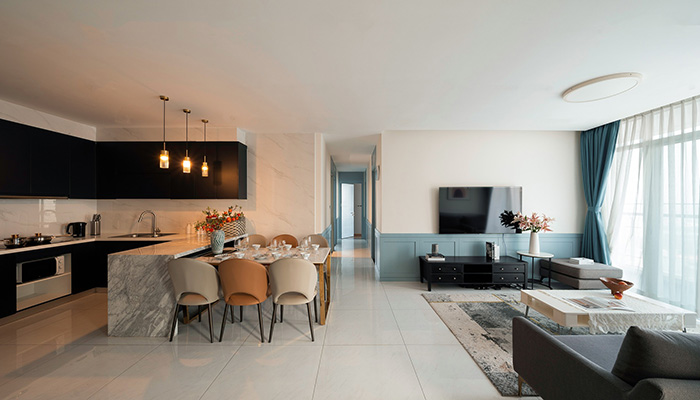The worshipping house for Nguyen Khuyen
Nguyen Khuyen is a prominent poet in Vietnamese literature. He achieved remarkable academic success, passing the highest three levels of the imperial examination: the Huong Cong degree, the Hoi Nguyen degree, and the Dinh Nguyen degree. As a result, he was affectionately referred to as "Tam Nguyen Yen Do," (Yen Do’s first-rate graduate three times), and Yen Do Village is his hometown, located in the tranquil rice fields of the former Ha Nam province.
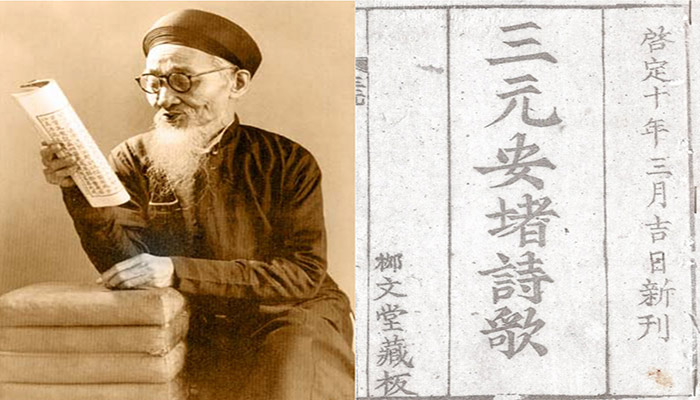
The beauty of the northern countryside has been praised numerous times in Nguyen Khuyen's poetic verses. To fully appreciate each word and emotion that the poet infused into his works, you can visit the worshipping house for Nguyen Khuyen, a famous landmark in Vi Ha Village (commonly called Va Ha Village), Trung Luong Commune, Binh Luc District, Ha Nam Province.
In 1843, the local residents pooled their resources to build a house and welcome Nguyen Lien, the poet's father, to teach the children of the village. This place served as both a school and the poet's residence upon returning to his homeland.
In 1861, he sold parts of his house to make ends meet due to financial difficulties.
By 1871, he became a mandarin. At the age of 50, in 1884, he retired and returned to his hometown. However, he did not live on the old land as it was too cramped after the sale. Instead, he constructed a new house with columns and frames from his previous property, covering an area of one "sao" of residential land and five "sao" of ponds.
In 1889, his son Nguyen Hoan acquired more land and expanded the pond to nine "sao."
On this land, Deputy Magistrate Nguyen Hoan built a communal temple and several other structures, including a communal temple designed with two parallel sentences, with a main hall of seven sections in front and a three-section rear hall separated by a small courtyard.
In 1915, the poet's direct descendant Thua Du, Nguyen Hoan's eldest son, sold the seven-section main hall to the people of Giai Dong Village (now part of Trung Luong Commune, Binh Luc District) to convert it into a communal house.
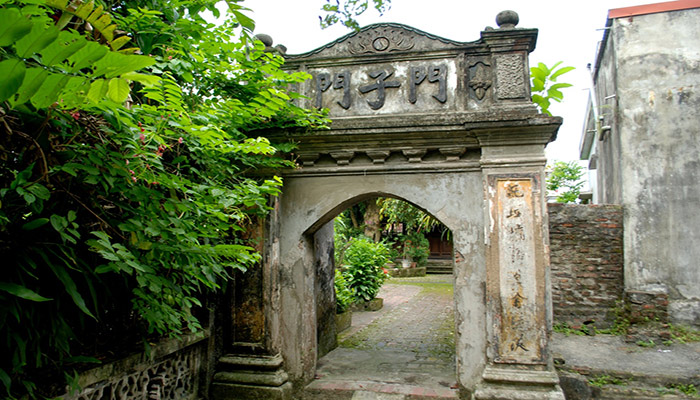
On the remaining land, there stands an ancient brick gate and the three rear sections of the communal temple that were intimately connected with the poet during the last 20 years of his life, witnessing his final breath. The old garden continues to flourish with flowers and fruits. These three sections have now become the worshipping house for Nguyen Khuyen.
Stepping into Nguyen Khuyen’s worshipping house, you are transported back to the past, enveloped in a serene, ancient ambiance filled with literary sentiments. Twisting bamboo lanes lead to an old brick gate adorned with the large character "Mon Tu Mon" (Gateway for Students). The lane features traditional architecture, and the brick gate showcases the distinctive and common style found in rural areas of the northern region. This place preserves various artifacts, couplets gifted by scholars to the poet, photographs from political engagements, and the poet's works.
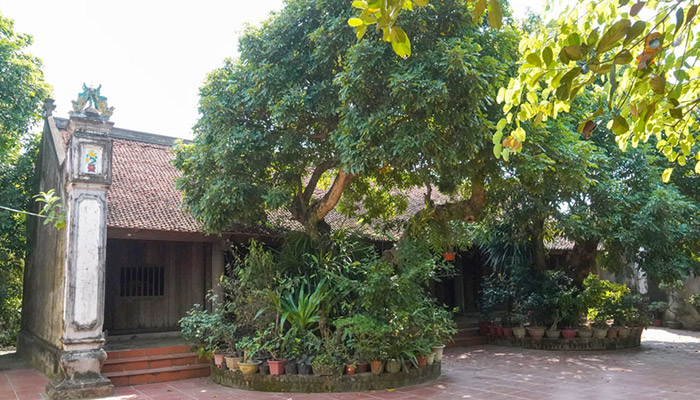
Aside from pre-existing and newly constructed architecture occupying about one-third of the area, the majority of the space is dedicated to fruit-bearing trees. These trees include lychee, jackfruit, coconut, and areca nut, as well as oranges, pomelos, custard apples, and guavas, each flourishing in its respective season. In front of the three rear sections of the temple, there are jasmine, lily, rose, and orchid flowers, blooming alternately, perpetually perfuming the surroundings.
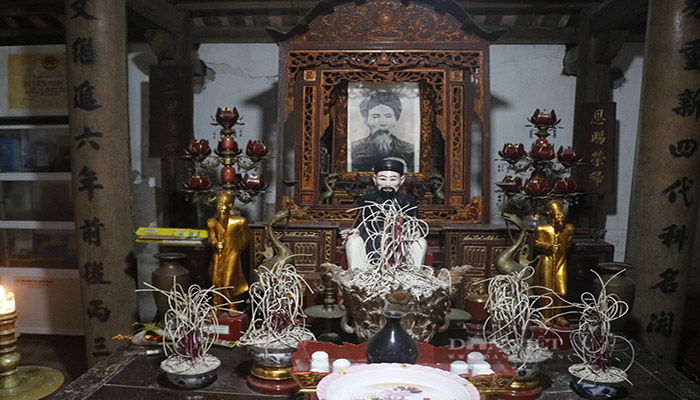
A photograph captures Nguyen Khuyen, wearing a turban and traditional long robe, holding a plate of jackfruit seeds. This photo was taken during his lifetime and is displayed with great reverence in Nguyen Khuyen Lane. In his poem “Đề ảnh”, the poet pondered:
“A hundred plates with my image, I gift this image of me
A thousand years later, who will I be?”
Perhaps even the poet himself did not fully realize the enduring legacy of his name and works within Vietnamese literature. His verses have found a place in literary collections, and his name remains immortal, a testament to the enduring values that enrich the fabric of Vietnamese literature.
If you have the chance to visit Ha Nam, come to Nguyen Khuyen’s worshipping house to immerse yourself in the poetic atmosphere and satisfy your romantic and emotional soul.

The beauty of the northern countryside has been praised numerous times in Nguyen Khuyen's poetic verses. To fully appreciate each word and emotion that the poet infused into his works, you can visit the worshipping house for Nguyen Khuyen, a famous landmark in Vi Ha Village (commonly called Va Ha Village), Trung Luong Commune, Binh Luc District, Ha Nam Province.
In 1843, the local residents pooled their resources to build a house and welcome Nguyen Lien, the poet's father, to teach the children of the village. This place served as both a school and the poet's residence upon returning to his homeland.
In 1861, he sold parts of his house to make ends meet due to financial difficulties.
By 1871, he became a mandarin. At the age of 50, in 1884, he retired and returned to his hometown. However, he did not live on the old land as it was too cramped after the sale. Instead, he constructed a new house with columns and frames from his previous property, covering an area of one "sao" of residential land and five "sao" of ponds.
In 1889, his son Nguyen Hoan acquired more land and expanded the pond to nine "sao."
On this land, Deputy Magistrate Nguyen Hoan built a communal temple and several other structures, including a communal temple designed with two parallel sentences, with a main hall of seven sections in front and a three-section rear hall separated by a small courtyard.
In 1915, the poet's direct descendant Thua Du, Nguyen Hoan's eldest son, sold the seven-section main hall to the people of Giai Dong Village (now part of Trung Luong Commune, Binh Luc District) to convert it into a communal house.

On the remaining land, there stands an ancient brick gate and the three rear sections of the communal temple that were intimately connected with the poet during the last 20 years of his life, witnessing his final breath. The old garden continues to flourish with flowers and fruits. These three sections have now become the worshipping house for Nguyen Khuyen.
Stepping into Nguyen Khuyen’s worshipping house, you are transported back to the past, enveloped in a serene, ancient ambiance filled with literary sentiments. Twisting bamboo lanes lead to an old brick gate adorned with the large character "Mon Tu Mon" (Gateway for Students). The lane features traditional architecture, and the brick gate showcases the distinctive and common style found in rural areas of the northern region. This place preserves various artifacts, couplets gifted by scholars to the poet, photographs from political engagements, and the poet's works.

Aside from pre-existing and newly constructed architecture occupying about one-third of the area, the majority of the space is dedicated to fruit-bearing trees. These trees include lychee, jackfruit, coconut, and areca nut, as well as oranges, pomelos, custard apples, and guavas, each flourishing in its respective season. In front of the three rear sections of the temple, there are jasmine, lily, rose, and orchid flowers, blooming alternately, perpetually perfuming the surroundings.

A photograph captures Nguyen Khuyen, wearing a turban and traditional long robe, holding a plate of jackfruit seeds. This photo was taken during his lifetime and is displayed with great reverence in Nguyen Khuyen Lane. In his poem “Đề ảnh”, the poet pondered:
“A hundred plates with my image, I gift this image of me
A thousand years later, who will I be?”
Perhaps even the poet himself did not fully realize the enduring legacy of his name and works within Vietnamese literature. His verses have found a place in literary collections, and his name remains immortal, a testament to the enduring values that enrich the fabric of Vietnamese literature.
If you have the chance to visit Ha Nam, come to Nguyen Khuyen’s worshipping house to immerse yourself in the poetic atmosphere and satisfy your romantic and emotional soul.

.jpg)
